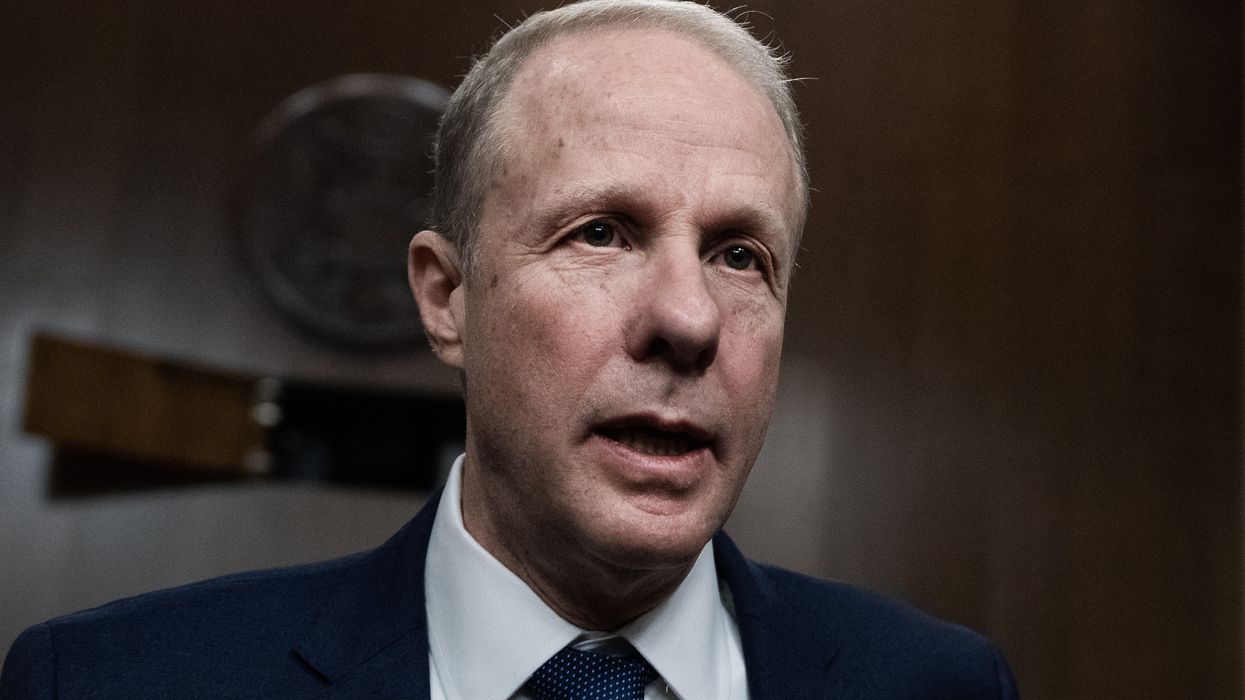Billionaire investor and prominent private equity firm Cerberus Capital Management CEO Stephen Feinberg’s possible ascension to the Pentagon’s No. 2 role is a textbook case of the military industrial complex revolving door.
You wouldn’t know that from yesterday’s Senate Armed Services Committee confirmation hearing for Feinberg, President Trump’s nominee for Deputy Secretary of Defense, though. Largely welcoming Feinberg’s weapons industry background, senators instead probed Feinberg’s views on proposed Department of Government Efficiency (DOGE) cuts and Ukraine amid Trump era political turbulence.
Who is Stephen Feinberg?
A longtime military investor vis a vis Cerberus Capital Management, which holds about $65 billion in assets across various industries, possible conflicts of interests embroil Feinberg’s possible DoD ascension.
Indeed, Feinberg’s Cerberus sports a controversial investment track record in the defense sector. The head of the first Trump administration’s intelligence advisory board, Feinberg previously owned national security contractor DynCorp (now owned by Amentum) through Cerberus, where DynCorp controversially trained U.S.-backed fighters in Iraq, Liberia, and Afghanistan under his tenure. Some of Cerberus’ defense-related portfolio holdings, like Navistar Defense and TransDigm, have been notorious for price-gouging equipment for clients like the U.S. Marines Corps. And Cerberus-affiliated Tier 1 Group had infamously trained members of a Saudi hit team who killed Washington Post journalist Jamal Khashoggi in 2018.
These matters considered, it’s curious that none of this was raised during Tuesday’s hearing, as Feinberg would be overseeing the DoD’s day-to-day operations — including managing the defense budget — as the department's second-in-command.
In fairness, Feinberg says he’ll divest from Cerberus stake to avoid a conflict of interest if confirmed. Indeed, Senator Eric Schmitt (R-Mo.) thanked Feinberg for his pledged divestment at the hearing.
But as Quincy Institute Senior Research Fellow William Hartung explains: “Divestment alone doesn’t remove the potential for future conflicts of interest.”
“[He] could make or influence decisions that might benefit companies he would want to work for or invest in when he leaves the Pentagon. The only way to address that larger issue would be for Feinberg to pledge that he would not work for or invest in weapons firms after he leaves the Pentagon,” Hartung said.
Senators embrace Feinberg's military industry ties, question his DOGE, Russia views
Despite the stakes, Feinberg’s controversial military contracting history went largely unquestioned at the confirmation hearing. Instead, senators present, including Senators Roger Wicker (R- Miss.), Tim Kaine (D-Va)., Jim Banks (R- Ind.), and Rick Scott (R - Fl.), often chalked up this history as experience critical for the role.
“We need someone who can work alongside the secretary, harnessing the American spirit to ensure that the United States outpaces our adversaries, someone who knows how to reform organizations, improve outputs, harness innovations,” said Senator Wicker. “Not only, Mr. Feinberg, do you have extensive background investing in sectors critical to national security, but you also served on the President's Intelligence Advisory Board. So thank you for that.”
“Your background is so perfect to go there and change the way [military] acquisitions are done at the Pentagon,” Senator Banks complimented Feinberg.
Appreciating Feinberg’s weapons industry know-how, multiple senators asked about how to reinvigorate the U.S. defense industrial base and streamline weapons procurement; Feinberg’s answers, which often underscored the needs of the private sector, showcased his long-term MIC status.
To help smaller weapons manufacturers succeed, for example, Feinberg suggested loosening regulations for military contracts. “You've seen it from the private sector. The requirements [for military contractors] are gold-plated, rigid, inflexible…Loosen up the requirements. Make it more based on mission,” Feinberg said. “Less gold-plated, quicker, more nimble.”
Feinberg called repeatedly for the bolstered development of advanced weapons technologies, including hypersonic technologies, citing threats like China. He also backed the need for autonomous systems in weapons production. (Interestingly, Cerberus established a hypersonics advancement business, North Wind, last year. And its venture capital arm, Cerberus Ventures, founded in 2023, sports a defense tech-heavy investment strategy.)
And while Senator Elizabeth Warren (D- Mass.) slammed Cerberus’ controversial management of some Massachusetts-based hospital systems, she stopped short of critiquing Feinberg’s weapons industry dealings at the hearing.
A February 17 press release and letter to Feinberg from Warren’s office, however, outlined her concerns about Feinberg’s military industry ties and Khashoggi murder connection respectively.
But the hearing wasn’t a cakewalk. Other senators present did grill Feinberg — mostly on other Trump administration ongoings.
“What do you have to say to the veterans at the Department of Defense whom Elon Musk is firing?,” Senator Richard Blumenthal asked, mentioning suggested DOGE job cuts for the DoD. Citing the Trump administration’s Ukraine war about-face, Senators Tammy Duckworth (D- Ill.) and Mark Kelly (D-Ariz.) explicitly asked Feinberg whether Russia invaded Ukraine; Feinberg dodged the questions, citing the sensitivity of ongoing diplomatic developments.
Feinberg clarified he would likely follow through with Trump administration efforts to streamline the department if formalized, including possible budget and staff cuts (though, the budget “cuts” proposed so far essentially move funds around the DoD).
Even so, Feinberg’s nods to the private sector, and statements about streamlined weapons procurement and bolstering advanced technologies, like autonomous systems and hypersonic tech, suggest a Feinberg-staffed DoD may ultimately be friendly towards a contract-hungry weapons industry.
A full Senate confirmation vote for Feinberg has yet to be scheduled.
- Thiel pal and venture capitalist eyed for 2nd highest post in Pentagon ›
- Billionaire tied to shady military ops could be no. 2 Pentagon pick ›














